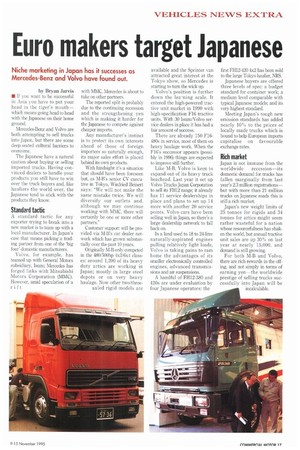Euro makers target Japanese
Page 19

If you've noticed an error in this article please click here to report it so we can fix it.
Niche marketing in Japan has it successes as Mercedes-Benz and Volvo have found out.
by Bryan Jarvis • If you want to be successful in Asia you have to put your head in the tiger's mouth— which means going head to head with the Japanese on their home ground.
Mercedes-Benz and Volvo are both attempting to sell trucks into Japan, but there are some deep-seated cultural barriers to overcome.
The Japanese have a natural caution about buying or selling imported trucks. Having convinced dealers to handle your products you still have to win over the truck buyers and, like hauliers the world over, the Japanese tend to stick with the products they know.
Standard tactic
A standard tactic for any exporter trying to break into a new market is to team up with a local manufacturer. In Japan's case that means picking a trading partner from one of the big four' domestic manufacturers.
Volvo, for example, has teamed up with General Motors subsidiary, Isuzu; Mercedes has forged links with Mitsubishi Motors Corporation (MMC). However, amid speculation of a rift with MMC, Mercedes is about to take on other partners.
The reported split is probably due to the continuing recession and the strengthening yen which is making it harder for the Japanese to compete against cheaper imports.
Any manufacturer's instinct is to protect its own interests ahead of those of foreign importers so naturally enough, its major sales effort is placed behind its own products.
With hindsight it's a situation that should have been foreseen but, as M-B's senior CV executive in Tokyo, Winfried Beinert says: "We will not make the same mistake twice. We will diversify our outlets and, although we may continue working with MMC. there will certainly be one or more other partners."
Customer support will be provided via M-B's car dealer network which has grown substantially over the past 10 years.
Originally M-B only competed in the 480/500hp 4x2/6x4 classes: around 1,200 of its heavy duty artics are working in Japan; mostly in large steel depots or on very heavy haulage. Now other two/three axled rigid models are available and the Sprinter van attracted great interest at the Tokyo show, so Mercedes is starting to turn the wick up.
Volvo's position is further down the learning scale. It entered the high-powered tractive unit market in 1990 with high-specification F16 tractive units. With 30 Isuzu/Volvo service dealers in place it has had a fair amount of success.
There are already 150 F164&)s in service, most of them on heavy haulage work. When the F16's successor appears (possibly in 1996) things are expected to improve still further.
Like M-B, Volvo is keen to expand out of its heavy truck beachead. Last year it set up Volvo Trucks Japan Corporation to sell its FH12 range; it already has 11 service dealerships in place and plans to set up 14 more with another 20 service points. Volvo cars have been selling well in Japan, so there's a large dealership network to fall back on.
In a land used to 18 to 24-litre naturally-aspirated engines pulling relatively light loads, Volvo is taking pains to ram home the advantages of its smaller electronically controlled engines, advanced transmissions and air suspensions.
A handful of FH12-380 and 420s are under evaluation by four Japanese operators: the first FH12-420 4x2 has been sold to the large Tokyo haulier, MRS.
Japanese buyers are offered three levels of spec: a budget standard for container work; a medium level comparable with typical Japanese models; and its very highest standard.
Meeting Japan's tough new emission standards has added nearly 10% to the prices of locally made trucks which is bound to help European imports capitalise on favourable exchange rates.
Rich market
Japan is not immune from the worldwide recession—its domestic demand for trucks has fallen marginally from last year's 2.3 million registrations— but with more than 21 million trucks on Japanese roads this is still a rich market.
Japan's new weight limits of 25 tonnes for rigids and 34 tonnes for artics might seem rather wasteful for a nation whose resourcefulness has shaken the world, but annual tractive unit sales are up 30% on last year at nearly 15,000, and demand is still growing.
For both M-B and Volvo, there are rich rewards in the offing, and not simply in terms of
earning yen the worldwide prestige of selling trucks successfully into Japan will be incalculable.




















































































































